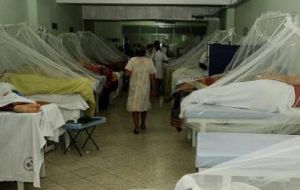MercoPress. South Atlantic News Agency
New strain of dengue further exposes Paraguay’s population to the spreading disease
 The number of deaths climbed to 26 and reported cases 13.044
The number of deaths climbed to 26 and reported cases 13.044 Paraguay health officials have detected a new strain of the tropical mosquito-transmitted disease dengue identified as serotype 4, the first case reported since last year which expands significantly the population’s exposure. Likewise the latest official report indicates 26 confirmed dengue deaths and over 13.000 infected.
“This is the first case of dengue 4; the last was in March 2012. He is a man in his fifties who lives in Pedro Jan Caballero, next to the Brazilian border; his condition remains stable and he is being treated at his home”, said the head of Health Vigilance Celia Martinez during a press conference.
At the Epidemiology Department, Dr Ana Fiandro explained the risks for all the Paraguayan population of the newly detected serotype circulating freely.
“When you catch dengue, your body creates immunity against that strain (serotype) and you won’t contract it for the rest of your life. However the strain 4 is relatively new and all the population that did not suffer it are exposed to strain 4”, said Dr. Fiandro.
She also mentioned that in other rainy seasons, strain one and two circulated in Paraguay which means those patients are also exposed to the new strain.
Dr Martinez reported that last Friday a seven year old child and a retired woman teacher died of haemorrhagic dengue, and in the evening the death of a nine-month old was confirmed.
“So far this year the number of deaths caused by dengue total 26, but we are also analyzing another 13 deaths”, said Dr Martinez who also pointed out that the epidemiological report refers to the first sex weeks of 2013.
The same report indicates that the number of dengue confirmed cases has climbed to 13.044.
Dengue fever also known as break-bone fever is an infectious tropical disease caused by the dengue virus. Symptoms include fever, headache, muscle and joint pains, and a characteristic skin rash that is similar to measles. In a small proportion of cases the disease develops into the life-threatening dengue hemorrhagic fever, resulting in bleeding, low levels of blood platelets and blood plasma leakage, or into dengue shock syndrome, where dangerously low blood pressure occurs.
Dengue is transmitted by several species of mosquito within the genus Aedes Aegypti. The virus has four different types; infection with one type usually gives lifelong immunity to that type, but only short-term immunity to the others. Subsequent infection with a different type increases the risk of severe complications. As there is no commercially available vaccine, prevention is sought by reducing the habitat and the number of mosquitoes and limiting exposure to bites.




Top Comments
Disclaimer & comment rules-

-

-

Read all commentsThis is a potentially very serious development if only for the fact that it adds another serotype to the pool that can create difficulties if the patient has already had an infection from one of the other serotypes.
Feb 18th, 2013 - 01:06 pm 0Unless and until the countries around Paraguay take dengue suppression seriously, in particular Argentina who this year did nothing at all to protect the citizens in the NW from this serious infection, then deaths from all serotype cross infections will increase unchecked.
What really exasperates me is that fact that even Brazil FORGET to treat the sources of mosquitoes in a timely fashion, it always takes deaths to wake everyone up. Is this a LatAm thing?
Have to say, Chris, the Dengue Control teams are pretty hot around the properties of coastal Bahia. But the back-beach lagoons are breeding grounds and the slow-flowing, often grossly faecally-polluted, rivers crossing the coastal strip means that Control cannot be 100%.
Feb 18th, 2013 - 09:10 pm 0I'm glad for what they do, but with both partner and friends who have already had one dengue dose, I fear for them greatly, and more so now.
2 GeoffWard2
Feb 19th, 2013 - 04:21 pm 0I agree and sympathize with you greatly Geof.
The husband of a British friend of mine living in Oz had it twice and the doctor was adamant that next time it would kill him. So they moved to Canterbury (UK) and when I checked the antibody log for dengue I discovered that dead birds examined in Kent had the antibody (meaning of course they had had the dengue virus).
I agonised whether I should tell them but when I did he was grateful to know the facts.
Perhaps I am teaching my granny to suck eggs here but the best you can do in the situation you find yourself in is to use the very best deterrents / inhibitors such as window screens, long-sleeved clothes, insecticide treated materials, coils and vaporizers.
You and your neighbours could team up and do a local vector examination to alert the local authorities to treat the areas in question. I don’t think, from my limited experience in SA that it is wise to rely on any government over this, though Uruguay do seem to be the most proactive of the lot.
Sorry if I am preaching Geof, but this is a potentially fatal disease for young children and aged adults and I would never forgive myself if you had not realised some of the things I have written. :o)
Commenting for this story is now closed.
If you have a Facebook account, become a fan and comment on our Facebook Page!